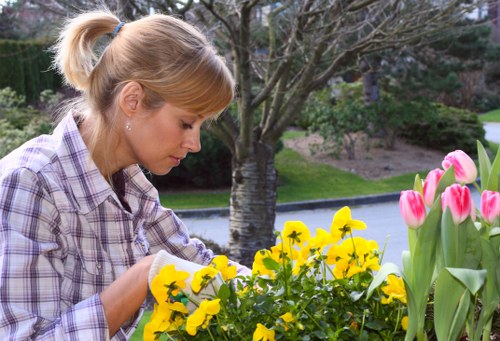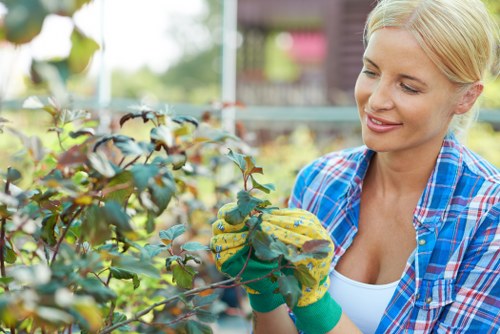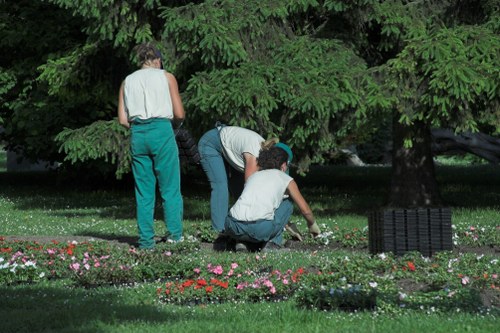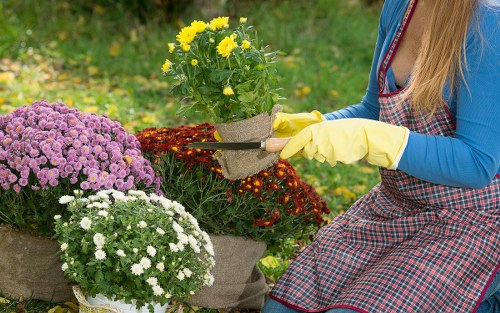Landscape Gardening in Cleaners E11

Transforming your outdoor space into a stunning garden can significantly enhance the aesthetic appeal and value of your property. In Cleaners E11, landscape gardening has become increasingly popular, with homeowners seeking professional services to create beautiful and sustainable gardens. Whether you're looking to design a serene retreat, a vibrant flower garden, or a functional outdoor space, landscape gardening offers endless possibilities.
One of the primary advantages of engaging in landscape gardening is the ability to customize your garden according to your personal preferences and the unique characteristics of your property. From selecting the right plants to designing pathways and seating areas, every element can be tailored to reflect your style and meet your needs.
Moreover, a well-designed landscape can contribute to the environmental health of your area. By incorporating native plants, reducing water usage, and promoting biodiversity, landscape gardening in Cleaners E11 not only beautifies your home but also supports local ecosystems.
Benefits of Landscape Gardening

Investing in landscape gardening offers numerous benefits that go beyond mere aesthetics. Here are some key advantages:
- Enhanced Curb Appeal: A beautifully landscaped garden can make a strong first impression, increasing the attractiveness of your property.
- Increased Property Value: Well-maintained gardens can significantly boost the market value of your home.
- Environmental Benefits: Gardens contribute to cleaner air, reduced carbon footprint, and support for local wildlife.
- Improved Mental Health: Spending time in a well-designed garden can reduce stress and enhance overall well-being.
- Energy Efficiency: Strategic planting can provide natural shading, reducing the need for artificial cooling and heating.
Additionally, landscape gardening can offer functional benefits such as creating outdoor living spaces, providing privacy, and defining property boundaries.
By choosing the right elements and maintaining your garden, you can enjoy these benefits for years to come.
Choosing the Right Plants for Your Garden

Selecting the appropriate plants is crucial for the success of your landscape garden. In Cleaners E11, the climate and soil conditions play a significant role in determining which plants will thrive. Here are some tips for choosing the right vegetation:
- Understand Your Climate: Consider the local climate, including temperature ranges, rainfall patterns, and sunlight exposure.
- Soil Testing: Conduct a soil test to determine its pH level, fertility, and drainage capabilities.
- Native Plants: Opt for native species that are well-adapted to the local environment and require minimal maintenance.
- Seasonal Variety: Incorporate plants that offer color and interest throughout the year, ensuring your garden remains vibrant in all seasons.
- Maintenance Requirements: Choose plants that match your lifestyle and the level of maintenance you're willing to commit to.
By carefully selecting plants that are suited to your specific conditions, you can create a resilient and thriving garden.
Additionally, grouping plants with similar water and sunlight needs can simplify maintenance and promote healthier growth.
Designing Your Landscape

Designing your landscape involves both creative and practical considerations. A well-thought-out design can maximize the functionality and beauty of your outdoor space. Here are some essential elements to consider:
- Layout and Structure: Plan the overall layout, including the placement of plants, pathways, seating areas, and other features.
- Focal Points: Incorporate focal points such as fountains, sculptures, or flowering trees to draw attention and create visual interest.
- Balance and Proportion: Ensure that the elements of your garden are balanced and proportionate to create harmony.
- Texture and Color: Use a variety of textures and colors to add depth and vitality to your garden.
- Lighting: Integrate outdoor lighting to highlight key features and extend the usability of your garden into the evening.
Additionally, consider the flow of movement through your garden. Pathways should guide visitors naturally from one area to another, enhancing the overall experience.
Incorporating sustainable design principles, such as rainwater harvesting and using recycled materials, can also contribute to an eco-friendly landscape.
Hardscaping Elements

Hardscaping refers to the non-living elements of your garden, such as stone pathways, patios, walls, and fences. These elements provide structure and functionality while complementing the natural elements. Here are some key hardscaping components:
- Patios and Decks: Create outdoor living areas for entertaining, dining, or relaxing.
- Pathways: Define movement through the garden and connect different areas.
- Walls and Fences: Provide privacy, security, and vertical interest.
- Water Features: Incorporate fountains, ponds, or waterfalls for a soothing ambiance.
- Garden Structures: Add pergolas, gazebos, or arbors to enhance the aesthetic appeal.
Choosing high-quality materials and ensuring proper installation will ensure the longevity and durability of your hardscaping features.
Moreover, integrating hardscaping elements with the surrounding landscape creates a cohesive and unified design.
Sustainable Landscaping Practices

In today’s eco-conscious world, sustainable landscaping practices are more important than ever. Implementing these practices not only benefits the environment but also reduces maintenance efforts and costs in the long run. Here are some strategies for sustainable landscape gardening in Cleaners E11:
- Water Conservation: Use drought-resistant plants, install drip irrigation systems, and incorporate rain barrels to minimize water usage.
- Soil Health: Improve soil fertility with organic compost, mulch, and natural fertilizers.
- Native Plants: As mentioned earlier, native plants require less water and are more resistant to local pests and diseases.
- Energy Efficiency: Plant trees strategically to provide shade, reducing the need for air conditioning in summer.
- Waste Reduction: Recycle green waste by composting and use reclaimed materials for hardscaping.
By adopting these sustainable practices, you can create a garden that is both beautiful and environmentally responsible.
Additionally, sustainable landscaping can enhance biodiversity, providing habitats for pollinators and other beneficial wildlife.
Maintenance Tips for a Thriving Garden

Maintaining your landscape garden is essential to ensure its health and beauty. Here are some practical maintenance tips for gardeners in Cleaners E11:
- Regular Watering: Ensure that plants receive adequate water, especially during dry spells. Early morning is the best time to water to minimize evaporation.
- Pruning and Trimming: Regularly prune trees, shrubs, and plants to promote healthy growth and prevent overgrowth.
- Weed Control: Keep weeds at bay by mulching and using organic or chemical weed control methods as needed.
- Pest Management: Monitor your garden for signs of pests and diseases, and take appropriate measures to control them.
- Fertilization: Apply fertilizers based on the specific needs of your plants to encourage robust growth.
Additionally, seasonal tasks such as leaf cleanup, soil aeration, and planting seasonal flowers can keep your garden vibrant year-round.
Implementing a regular maintenance schedule simplifies these tasks and ensures your garden remains in top condition.
Choosing a Professional Landscape Gardener in Cleaners E11

While DIY gardening can be fulfilling, hiring a professional landscape gardener in Cleaners E11 can save time and ensure a high-quality result. Here are some factors to consider when selecting a landscape gardening service:
- Experience and Expertise: Look for professionals with a proven track record and expertise in various aspects of landscape gardening.
- Portfolio: Review their previous projects to gauge their design style and quality of work.
- Client Reviews: Check testimonials and reviews to understand their reputation and customer satisfaction levels.
- Services Offered: Ensure that the gardener offers the specific services you need, whether it’s design, installation, maintenance, or all of the above.
- Licensing and Insurance: Verify that the landscaper is properly licensed and insured to protect against any potential issues.
Additionally, a good landscape gardener should provide a detailed plan and transparent pricing, allowing you to make informed decisions.
Communicating your vision clearly and collaborating with the professional will result in a garden that meets your expectations.
Cost Considerations

The cost of landscape gardening in Cleaners E11 can vary widely based on the scope and complexity of the project. Here are some factors that influence the overall cost:
- Project Size: Larger gardens require more materials and labor, increasing the cost.
- Design Complexity: Intricate designs with multiple elements like water features, lighting, and hardscaping will be more expensive.
- Material Quality: High-quality materials such as natural stone, premium plants, and sustainable resources can raise the budget.
- Labor Costs: Skilled labor and specialized services may come at a higher price point.
- Maintenance Requirements: Ongoing maintenance services will add to the long-term cost.
To manage costs effectively, it’s essential to establish a clear budget from the outset and prioritize the elements that are most important to you.
Additionally, obtaining multiple quotes and comparing services can help ensure you receive the best value for your investment.
Incorporating Technology in Landscape Gardening

Modern technology has revolutionized landscape gardening, offering innovative solutions that enhance design, maintenance, and sustainability. Here are some technological advancements to consider:
- Smart Irrigation Systems: Automated watering systems that adjust based on weather conditions can optimize water usage and reduce waste.
- Landscape Design Software: Advanced software tools allow for precise planning and visualization of garden layouts before implementation.
- LED Lighting: Energy-efficient LED lights can highlight key garden features and create stunning nighttime effects.
- Drones: Used for surveying large properties, drones can provide detailed aerial views for better planning.
- Soil Sensors: These sensors monitor soil moisture, temperature, and nutrient levels, ensuring optimal plant health.
Integrating these technologies can streamline garden management, improve efficiency, and contribute to a more sustainable landscape.
Embracing technology in landscape gardening not only enhances functionality but also opens up new creative possibilities for design and maintenance.
Eco-Friendly Practices

Adopting eco-friendly practices in your garden is essential for promoting sustainability and protecting the environment. Here are some strategies to incorporate green practices into your landscape gardening:
- Composting: Turn organic waste into nutrient-rich compost to enrich your soil naturally.
- Rainwater Harvesting: Collect and store rainwater for irrigation, reducing dependence on municipal water supplies.
- Solar Lighting: Use solar-powered lights to illuminate your garden without increasing your energy consumption.
- Organic Pest Control: Utilize natural pest control methods to protect your plants without harmful chemicals.
- Permeable Paving: Install permeable surfaces to allow rainwater to seep into the ground, preventing runoff and erosion.
Implementing these practices not only benefits the environment but also enhances the resilience and longevity of your garden.
Moreover, eco-friendly gardening can lead to healthier plants and a more balanced ecosystem within your outdoor space.
Seasonal Gardening Tips

Maintaining a vibrant garden requires attention to seasonal changes. Each season presents unique challenges and opportunities for landscape gardening in Cleaners E11. Here are some seasonal tips to keep your garden thriving throughout the year:
- Spring: Focus on planting new flowers, pruning trees, and preparing the soil for the growing season.
- Summer: Ensure adequate watering, control weeds, and protect plants from pests and excessive heat.
- Autumn: Prepare your garden for winter by mulching, planting bulbs for spring, and removing spent plants.
- Winter: Protect sensitive plants from frost, plan next year’s garden, and perform maintenance tasks such as tool sharpening.
By adapting your gardening practices to each season, you can maintain a healthy and beautiful landscape all year round.
Additionally, seasonal planting can provide continuous color and interest, enhancing the overall appeal of your garden.
Container Gardening

For those with limited space or looking to add versatility to their garden, container gardening is an excellent option. This method involves growing plants in various containers, allowing for greater flexibility and mobility. Benefits of container gardening include:
- Space Efficiency: Ideal for small gardens, balconies, or patios where space is limited.
- Versatility: Easily move containers to suit changing light conditions or to rearrange garden layouts.
- Control Over Soil Quality: Choose the best soil mix for your plants, ensuring optimal growth conditions.
- Accessibility: Raised containers make gardening more accessible for individuals with mobility issues.
- Pest Management: Containers can reduce the risk of soil-borne pests and diseases.
Container gardening allows you to experiment with different plant varieties and designs without committing to permanent changes.
Additionally, it’s a great way to introduce colorful and diverse plant life into your landscape garden.
The Role of Mulching in Garden Health

Mulching is a fundamental practice in landscape gardening that offers numerous benefits for plant health and garden aesthetics. Mulch is a layer of material applied to the soil surface, and it can be organic or inorganic. Key benefits of mulching include:
- Moisture Retention: Mulch helps retain soil moisture by reducing evaporation, which is especially beneficial during dry periods.
- Weed Suppression: A thick layer of mulch can prevent weed growth by blocking sunlight and inhibiting weed seed germination.
- Soil Temperature Regulation: Mulch acts as an insulator, keeping the soil cooler in summer and warmer in winter.
- Soil Health Improvement: Organic mulches decompose over time, enriching the soil with nutrients and improving its structure.
- Erosion Prevention: Mulch protects the soil from erosion caused by heavy rains and wind.
Common types of mulch include bark, straw, grass clippings, and compost. Selecting the right mulch type depends on your garden’s needs and aesthetic preferences.
Proper mulching techniques, such as maintaining an appropriate depth and ensuring mulch does not touch plant stems, are essential for maximizing its benefits.
Planting Trees and Shrubs

Trees and shrubs are integral components of a landscape garden, providing structure, shade, and beauty. When planting trees and shrubs in Cleaners E11, consider the following:
- Species Selection: Choose trees and shrubs that are well-suited to the local climate, soil type, and available space.
- Placement: Plan the location carefully to ensure adequate space for growth and to achieve the desired aesthetic effect.
- Planting Technique: Follow proper planting guidelines, including correct depth, spacing, and soil preparation.
- Maintenance: Regularly water, prune, and monitor trees and shrubs to maintain their health and appearance.
- Integration: Ensure that trees and shrubs complement other garden elements and contribute to the overall design.
Strategically planted trees and shrubs can provide natural screening, create microclimates, and enhance the overall harmony of your garden.
Additionally, they can offer habitats for wildlife, contributing to the biodiversity of your landscape.
Enhancing Garden Privacy

Privacy is a common concern for many homeowners looking to enjoy their outdoor spaces without intrusive views. Landscape gardening offers several solutions to enhance privacy in Cleaners E11:
- Hedges: Dense hedges made of evergreen shrubs provide year-round privacy and act as natural sound barriers.
- Fencing: Installing fences with decorative elements can create a clear boundary while enhancing the garden's aesthetic appeal.
- Screening Plants: Strategically placed tall plants or climbing vines can serve as natural screens.
- Garden Structures: Pergolas, trellises, and arbors can offer both privacy and structural interest.
- Water Features: Incorporating water elements can mask noise and add to the sense of seclusion.
By combining these elements, you can create a private oasis that allows you to fully enjoy your garden.
Additionally, thoughtful placement of trees and shrubs can maximize privacy while maintaining an open and inviting layout.
Outdoor Lighting Solutions

Outdoor lighting is a vital aspect of landscape gardening, enhancing both the beauty and functionality of your garden after dark. Effective lighting can highlight key features, improve safety, and extend your outdoor living space into the evening hours. Here are some outdoor lighting solutions to consider:
- Path Lighting: Illuminate walkways and pathways to guide movement and prevent accidents.
- Accent Lighting: Highlight specific garden features such as trees, sculptures, or water elements.
- Ambient Lighting: Create a warm and inviting atmosphere with soft, diffused lighting.
- Security Lighting: Enhance safety by installing motion-sensor lights around entry points and dark areas.
- Solar Lighting: Use energy-efficient solar-powered lights to reduce electricity usage and environmental impact.
Integrating a combination of these lighting solutions can create a well-lit, aesthetically pleasing, and safe garden environment.
Additionally, layering different types of lighting adds depth and dimension, making your garden more visually interesting at night.
Creating Functional Outdoor Spaces

A landscape garden is not just about beauty; it's also about functionality. Creating functional outdoor spaces allows you to fully utilize your garden for various activities. Here are some ideas for functional outdoor spaces:
- Outdoor Living Areas: Designate areas for seating, dining, and lounging, equipped with comfortable furniture and shelter.
- Kitchen Gardens: Incorporate spaces for growing herbs, vegetables, and fruits, promoting self-sufficiency and fresh produce.
- Play Areas: Create safe and engaging spaces for children to play and explore.
- Workspaces: Designate areas for outdoor hobbies, crafts, or even remote work.
- Exercise Zones: Set up spaces for outdoor fitness activities such as yoga, tai chi, or gardening.
By thoughtfully designing these functional areas, you can make your garden a versatile and enjoyable extension of your home.
Furthermore, functional outdoor spaces can enhance your quality of life, providing areas for relaxation, socializing, and personal growth.
Incorporating Art into Your Garden

Artistic elements can add a unique and personal touch to your landscape garden. Incorporating art into your garden design enhances its visual appeal and reflects your individual style. Here are some ways to incorporate art into your garden:
- Sculptures and Statues: Place artistic sculptures or statues as focal points or throughout the garden to add intrigue.
- Garden Ornaments: Use decorative items such as wind chimes, birdbaths, and decorative pots to enhance the garden's charm.
- Mosaics and Murals: Create colorful mosaics or murals on garden walls, pathways, or other surfaces.
- Functional Art: Integrate art into functional elements like benches, pergolas, and fences for a seamless blend of beauty and utility.
- Interactive Art: Incorporate elements that engage the senses, such as kinetic sculptures or sound installations.
By thoughtfully selecting and placing artistic elements, you can create a garden that is not only beautiful but also emotionally resonant.
Moreover, art can serve as a conversation starter, making your garden a memorable space for visitors.
Conclusion

Landscape gardening in Cleaners E11 offers a myriad of opportunities to create a beautiful, functional, and sustainable outdoor space. By understanding the benefits, choosing the right plants, designing thoughtfully, and incorporating sustainable practices, you can transform your garden into a personal paradise.
Whether you're a seasoned gardener or just starting, professional landscape gardening services can provide the expertise and support needed to bring your vision to life.
Embrace the art of landscape gardening to enhance your home's beauty, support the environment, and enjoy a serene outdoor retreat.
Ready to transform your outdoor space? Contact us today to book your landscape gardening service in Cleaners E11 and start creating the garden of your dreams.


